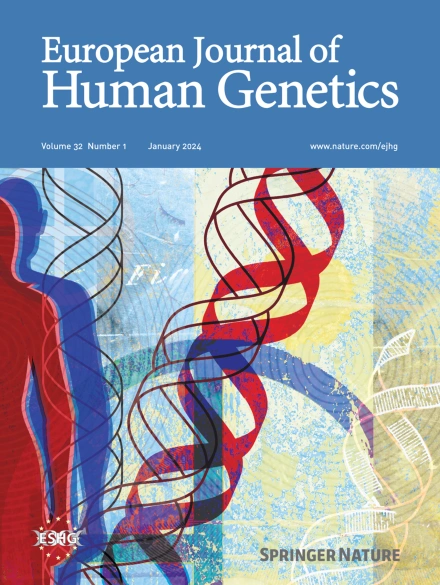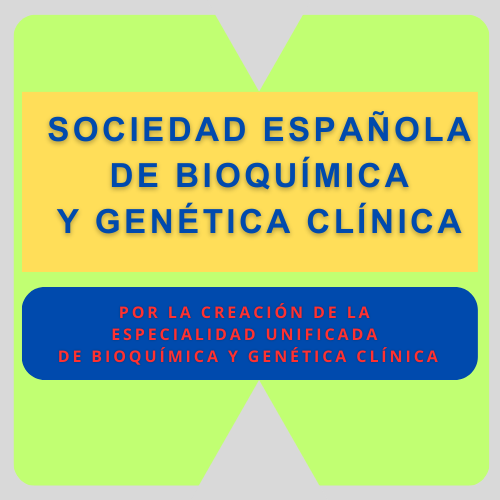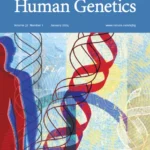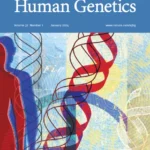Eur J Hum Genet


- Systematic benchmarking demonstrates large language models have not reached the diagnostic accuracy of traditional rare-disease decision support tools
- Parental experiences of receiving genomic newborn screening results: findings from the BabyScreen+ study
- “It was up to me to be curious”: perceptions and experiences of students with intellectual disability on genetics and health education
- A qualitative study exploring young adult’s attitudes towards adopting whole genome sequencing into newborn screening programs
- Integrating germline and tumor sequencing to improve hereditary cancer diagnosis and care
- Flexible and rapid validation of structural variation using adaptive sampling
- Personal utility of genomic results: Application and validation of the PrU scale to the Australian context
- Ongoing refinements in chronological frameworks describing the presence of Indo-European/Indic languages in the Indian subcontinent
- <i>TMC6/8</i>-associated epidermodysplasia verruciformis: germline variants and a complex structural alteration in a skin cancer predisposition syndrome
- An NGS-based investigation of copy number variants in the diagnosis and severity of adult polycystic kidney disease
- A homozygote mutation in <i>RPA2</i> associated with bone marrow failure, immunodeficiency, and telomere biology disorder
- Genetic counseling services for hereditary breast and ovarian cancer: patients’ experience and satisfaction with different service models
- Priority European strategies for sustainable access to high-quality genetic counselling in cancer: A Delphi study
- Impact of a digital platform on genetic counselling encounters in the screening context
- Delineating the Genetic Basis of <i>RNF213</i>-related vasculopathies: The association of <i>PKHD1</i> variants with bilateral cerebral vasculopathy
- Public and parent perspectives on genomic sequencing in newborn screening: a scoping review
- Navigating direct-to-consumer genetic testing: experiences, decisions and perspectives of Dutch users
- Two siblings with <i>CCDC32</i>-related cardiofacioneurodevelopmental syndrome diagnosed by clinical RNA-sequencing and review of literature
- The potential of whole genome sequencing in pharmacogenetics: a retrospective health record study in rare disease patients
- Genetic exploration of the relationship between liability to psychiatric disorders and acne vulgaris
- Advancing genomic medicine: Guidelines, risk scores, and disease discovery
- Results of a multigene panel testing approach targeting patients with suspected genetic predisposition to pancreatic ductal adenocarcinoma
- Non-invasive screening in hereditary cancer: a randomized controlled trial to test cell-free DNA-based early detection in the CHARM consortium
- De novo heterozygous variants of the <i>RSF1</i> gene are responsible for a syndromic neurodevelopmental disorder
- Expanding the genetic landscape of inherited metabolic diseases using long-read sequencing and transcriptomic profiling
- Genetic diagnosis of CYP21A2-related CAH: adaptive sampling long-read sequencing is an accurate and scalable solution
- The relationship between uncertainty and trust in genomic medicine and research: A literature review and thematic analysis
- New year, new insights in genomic medicine
- Integration of multi-omics data uncovers novel germline susceptibility candidates in early-onset colorectal cancer
- Rethinking genomics of facioscapulohumeral muscular dystrophy in the telomere-to-telomere era: pitfalls in the hidden landscape of D4Z4 repeats
- Pleiotropic genes linking congenital hypogonadotropic hypogonadism and cleft lip/palate: evidence from a genomic CHH cohort study
- ERN GENTURIS guideline on counselling on reproductive options for individuals with a cancer predisposition syndrome (including genturis)
- Childhood motor speech disorders: who to prioritise for genetic testing
- Innovative solutions to support mothers and fathers after genomic sequencing
- Performance of different polygenic risk scores for breast cancer risk prediction: in-depth evaluations across large UK and Australian cohorts
- Dutch Pharmacogenetics Working Group (DPWG) guideline for the gene–drug interaction between <i>CYP2D6</i> and <i>CYP2C19</i> and tricyclic antidepressants
- Unexpected genotypes associated with severe paediatric conditions identified in a healthy population cohort
- Experiencing acute genomic care: perspectives from parents in the neonatal and paediatric intensive care units towards rapid genomic sequencing
- Chronological frameworks for Indo-European languages: Insights from linguistics, archaeology and genomics
- Domain-specific phenotypic profiles in RAF1-related Noonan syndrome
- Insights from 2057 germline genetic tests in renal cell carcinoma patients support revisiting testing criteria
- Newly identified <i>ARF3</i> variants strengthen the causal link between Golgi fragmentation and brain malformations
- Clinical implementation of polygenic risk scores
- Promises under pressure: the modest predictive power of polygenic risk scores
- The absolute chronology of the presence of Indo-European/Indic languages in the Indian subcontinent
- Impact of <i>BRCA1/2</i> status on young women’s sexual function, relationships, and reproduction after predictive genetic testing
- A systematic analysis of mitochondrial aminoacyl tRNA synthetase variants in a rare disease cohort
- Exome sequencing points to pathogenic <i>ATM</i> variants in gastric cancer
- A homozygous variant in the beta-1,3-N-acetylglucosaminyltransferase 4 gene causes progressive brain atrophy and muscular dystrophy
- Hereditary diffuse gastric cancer in progress: Comparative lessons from Lynch syndrome
- Robert James McKinlay (“Mac”) Gardner
- Young people’s experience of predictive genetic testing for inherited cardiac conditions: a qualitative study
- Cascade counselling and testing. Recommendations of the European Society of Human Genetics
- “The ability to get ahead”: Australian parent perspectives on genomics in newborn screening and considerations for potential models of care
- Genomic pathway managers: a novel role in the genomic medicine care pathway in France—overview and perspectives
- Reconsidering a silent variant: <i>SGCA</i>’s role in atypical cardiomyopathy
- Fathers’ and Mothers’ support needs and support experiences after rapid genome sequencing
- Dutch Pharmacogenetics Working Group (DPWG) guideline for the gene-drug interaction between <i>TPMT</i>/<i>NUDT15</i> and thiopurines
- When clinical genetics turns the risk lens on itself
- <i>KIF1A</i>-associated neurological disorders: therapeutic opportunities and challenges
- Identification of an episignature for the <i>MEF2C</i>-associated syndrome
- Concerns about the consequences of cancer predisposition and relationships with quality of life in young adults with Li-Fraumeni syndrome
- Genetic analysis in fetuses with isolated clubfoot: diagnostic insights and added value
- Systematic review of preferences for additional findings from genomic testing
- Endometriosis – on the intersection of modern environmental pollutants and ancient genetic regulatory variants
- Enhancing the detection of familial hypercholesterolaemia in general practice: A model for supporting genetic cascade testing in the community
- Brugada Syndrome: an exemplar for the genomic basis of sudden death
- The efficacy of genetic counselling for familial colorectal cancer. A randomised clinical trial
- Advancing towards clear and patient-centred language in cancer genetics
- What is the power of a genomic multidisciplinary team approach? A systematic review of implementation and sustainability
- Loss of TBC1D2B causes a progressive neurological disorder with gingival overgrowth
- Perceptions and preferences for genetic testing for sickle cell disease or trait: a qualitative study in Cameroon, Ghana and Tanzania
- Genetic heterogeneity in hereditary hearing loss: Potential role of kinociliary protein TOGARAM2
- Expansion of the neurodevelopmental phenotype of individuals with <i>EEF1A2</i> variants and genotype-phenotype study
- The interplay of ethics and genetic technologies in balancing the social valuation of the human genome in UNESCO declarations
- Identification of people with Lynch syndrome from those presenting with colorectal cancer in England: baseline analysis of the diagnostic pathway
- Thirty-year of genetic counselling education in Europe: a growing professional area
- Correction: A new blood DNA methylation signature for Koolen-de Vries syndrome: Classification of missense <i>KANSL1</i> variants and comparison to fibroblast cells
- Ethical and social reflections on the proposed European Health Data Space
- The experience of receiving a letter from a cancer genetics clinic about risk for hereditary cancer
- Expanding the phenotypic spectrum of <i>LIG4</i> pathogenic variations: neuro-histopathological description of 4 fetuses with stenosis of the aqueduct
- Overcoming barriers to equitable genomic healthcare
- Phenotypic compatibility and specificity in genomic variant classification
- Identification of the DNA methylation signature of Mowat-Wilson syndrome
- Publics’ knowledge of, attitude to and motivation towards health-related genomics: a scoping review
- Mutations of GEMIN5 are associated with coenzyme Q<sub>10</sub> deficiency: long-term follow-up after treatment
- Bi-allelic <i>PRRT2</i> variants may predispose to Self-limited Familial Infantile Epilepsy
- 2023 in the European Journal of Human Genetics
- Using exomes better
- Patients’ perceptions and practices of informing relatives: a qualitative study within a randomised trial on healthcare-assisted risk disclosure
- The value of genomic testing in severe childhood speech disorders
- Diagnostic uplift through the implementation of short tandem repeat analysis using exome sequencing
- Blood donor biobank as a resource in personalised biomedical genetic research
- Reanalysis of genomic data, how do we do it now and what if we automate it? A qualitative study
- Genome, HLA and polygenic risk score analyses for prevalent and persistent cervical human papillomavirus (HPV) infections
- Confirmation and expansion of the phenotype of the <i>TCEAL1</i>-related neurodevelopmental disorder
- Expanding the phenotype of copy number variations involving <i>NR0B1</i> (<i>DAX1)</i>
- LanDis: the disease landscape explorer
- Validity of European-centric cardiometabolic polygenic scores in multi-ancestry populations
- Publisher Correction: A 39 kb structural variant causing Lynch syndrome detected by optical genome mapping and nanopore sequencing




